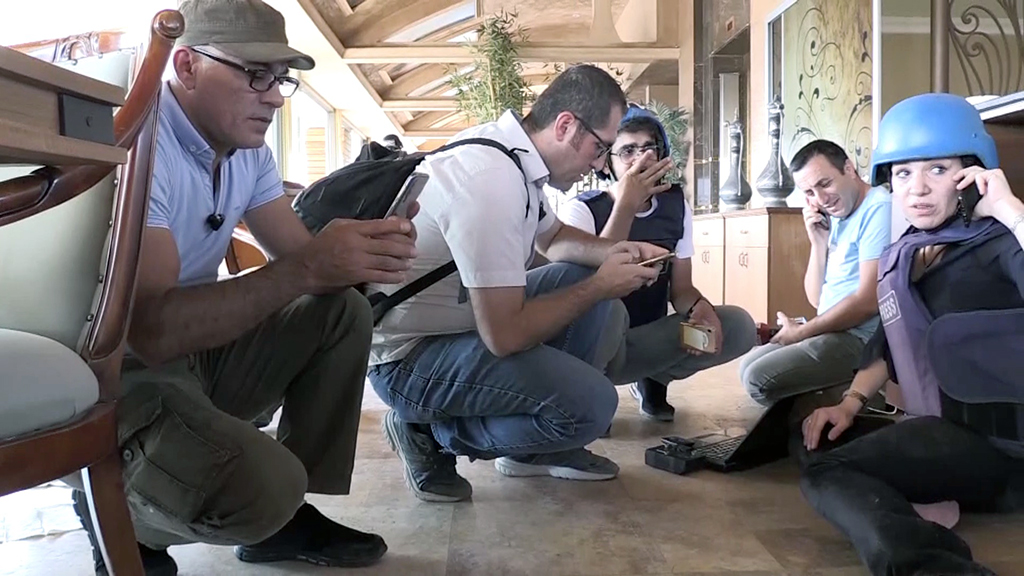Since the recent phone call between President Recep Tayyip Erdoğan and U.S. President Donald Trump last Sunday, we have seen that the major issue to debate has become the U.S. decision to withdraw from Syria. The intensity of objections to U.S. withdrawal from the area and the U.S. “green light” for Turkey’s operation raised several questions about the arguments and rationale behind such criticism.
First of all there are roughly three different groups of arguments against Trump’s decision to withdraw from Syria. The first group is on the Erdoğan-Trump relationship and they indicate their discomfort about potential Turkish-U.S. understanding on an operation in Syria.
For them the main problem is the fact that Turkey and the U.S. could make this decision together. Any potential cooperation in the region between the two countries would likely generate the same degree of complaint and protest from these commentators. In their writing, they forgot the fact that Turkey has been a NATO ally which fought alongside U.S. forces in Korea, Somalia, Kosovo and Afghanistan and a partner in the fight against terrorism since 9/11.
Instead of thinking about the implications of the continuation of the partnership between the U.S. and the People’s Protection Units (YPG) to Turkish-American relations, they seem determined to present the YPG as an alternative to Turkey in one of the most critical and unstable regions of the world. The consequences of the deterioration of relations with Turkey are never taken into account by these experts.
Meanwhile, the second and third groups’ arguments are mostly centered on U.S. domestic politics. For both groups, the essence and content of the decision is less important than the question of “who made that decision.”
Former officials, including those who had to leave their positions due to disagreement with President Trump about Syria expressed their dislike on the way the decision was made in the first place. Especially given the lack of U.S. strategy in Syria for many years we have seen that those responsible for operations in Syria on the ground have started to shape the policy in Syria as well.
Recent decisions by President Trump challenged this situation. Once again though, there is no long-term strategic objection to President Trump’s decision. The relations with the YPG are supposed to be “tactical, temporary and transactional.” However, with the winding down of the fight against Daesh in Syria, we started to see that there was no “exit strategy” on how to stop this cooperation.
Hence, the relationship under such circumstances is not sustainable and generates risk for the long-term planning of U.S. policy in the region.
The other group seems to be objecting this decision for domestic political considerations. Hillary Clinton was one of the first former high-level officials that objected this decision.
However, when she was secretary of state, in the declaration of her Asia Pivot policy she also criticized time lost in wars in Afghanistan and Iraq and endorsed the idea of focusing on new threats on U.S. economic, military and dominance around the world. Similarly, some of the Obama-era officials, who did very little to prevent the humanitarian tragedy in Syria and allowed the Syrian regime to use all of its destructive weapons to attack civilians have now started to talk about “ethnic cleansing” and a “humanitarian disaster.”
It seems more of a partisan objection to President Trump’s decision than a strategic and humanitarian issue. Once again those who made these objections are mostly people who did little while they occupied critical positions in the U.S. and who suggested no long-term solutions for the situation on the ground.
Both groups still did not provide any strategy or policy in Syria other than protecting the YPG and continuing the U.S. presence in Syria. Under these circumstances the rally on social media about President Trump’s decision seems to not be very genuine concerns about the situation on the ground, rather they seems to be concerned about who makes decisions and how in Washington.
[Daily Sabah, 14 October 2019]
In this article
- Opinion
- Afghanistan
- CENTCOM
- DAESH
- Daily Sabah
- Donald Trump
- East of the Euphrates
- Fight against DAESH
- Fight Against Terror
- Hillary Clinton
- Iraq
- Kosovo
- Kurdistan Workers' Party Terrorist Organization (PKK)
- Middle East
- NATO
- NATO Ally
- Operation Euphrates Shield
- Peace Corridor
- People's Protection Units (YPG)
- PKK - YPG - SDF - PYD - YPJ - SDG - HBDH - HPG - KCK - PJAK - TAK - YBŞ
- Recep Tayyip Erdoğan
- Safe Zone
- September 11 2001 Attacks | 9/11
- Syria
- Syrian Civil War
- Syrian Conflict
- Syrian Crisis
- Syrian Democratic Forces (SDF)
- Syrian National Army (SNA)
- Syrian National Coalition
- Syrian Opposition
- Syrian Refugees
- Terrorism
- Trump’s Syria Withdrawal
- Turkish Foreign Policy
- Turkish-American Relations
- Türkiye-US Relations
- Türkiye-US Security Relations
- Türkiye's Foreign Policy
- Türkiye's Operation Peace Spring
- Türkiye’s Operation Olive Branch
- United States (US)
- US President
- US Withdrawal from Syria
- US-PKK/PYD/YPG/SDF Relations
- US-Terror Relations
- Vladimir Putin



